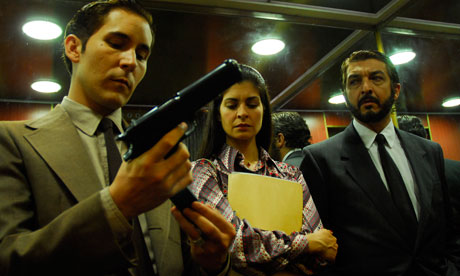The Secret in their Eyes Review
Argentinian director Juan Jose Campanella has proven with his latest film, The Secret In Their Eyes, that small budget foreign-language films can compete with the big boys as the excellent thriller dominated the Spanish and Argentinian box offices, did well in the US and walked away with an Oscar for best foreign-language film.
As a result, several British audience members should already be aware of the film and its director, who was also nominated for an Oscar for his film Son Of The Bride in 2001, and who’s made a name for himself in recent years directing episodes for some of the most popular US TV shows, such as House and Law & Order.
The Secret In Their Eyes is a dark, nourish thriller starring veteran Argentinian actor Ricardo Darin as retired barrister Benjamin Esposito who decides to write a book about and re-investigate an unsolved rape and murder case from 1974 which has haunted him, while at the same time rekindle an old flame for his boss, Irene Menendez Hastings (Soledad Villamil).
The playful chemistry between Benjamin and Irene is one of the key driving forces of the film as it jumps back and forth between the original murder investigation in the 1970s and the latest attempts in the 1990s to unravel the controversial pieces of the puzzle.
The film is dark in tone throughout, but with wonderful touches of humour, especially between Espinosa and junior barrister Sandoval, an alcoholic who keeps putting his foot in his mouth. Between them they soon uncover that the murderer must be an old friend of the victim still harbouring a sinister crush on her. Esposito is particularly moved by the devastating effect the murder has on the girl’s husband Ricardo Morales (Pablo Rago), making him even more determined to find the killer, leading to an interesting twist at the end of the film.
The pace of the movie can be quite slow at times with Campanella wandering off from the central plot focus in drawn out scenes of long dialogue, but these help to get a better feel for the characters and their motivations. The film also cleverly hints at political cover-ups and misdemeanors in the scenes from 1974 when the dictatorship years had only just finished in Argentina.
Overall, there is little to fault in this beautifully crafted thriller, which should appeal to men and women of all ages and backgrounds.
Last modified on








